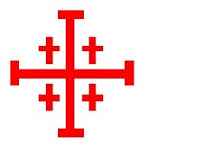 That is quite a different question than, “Why do people stay in the Episcopal Church?” The fundamental answer is in the call of God to be here in the first place. Let me state at the outset that no denominational group is pure. Human beings by virtue of the fall are corrupted and much of what we do is acceptable only under the grace and mercy of God. We faithful Christians are and will remain a blood washed band. Any student of history will tell you that there are heresies and problems in every church body; there always has been, there always will be.
That is quite a different question than, “Why do people stay in the Episcopal Church?” The fundamental answer is in the call of God to be here in the first place. Let me state at the outset that no denominational group is pure. Human beings by virtue of the fall are corrupted and much of what we do is acceptable only under the grace and mercy of God. We faithful Christians are and will remain a blood washed band. Any student of history will tell you that there are heresies and problems in every church body; there always has been, there always will be.
When I felt the call of God to join the Episcopal Church in the late nineteen sixties all of the present heresies were already flowering with the Episcopal Church. There is nothing touted in TEC today that wasn’t already being taught and modeled by the seminary that I graduated from; Death of God Theology, Situation Ethics, and Saul Alinsky style social reform, all were part of the ongoing agenda. Where do you think our current crop of Episcopal Church leaders came from? Even then the roots of the Episcopal Church sank down through an immense heap of rubbish into the deep soil and bedrock of church history.
In the first Epistle of John two fundamental heresies are identified. One is a heresy in the doctrine of Christ; the other is the heresy in praxis, fundamentally the failure of love. TEC notably demonstrates the failure in doctrine, and many of those who have fled from TEC in fear demonstrate a failure of praxis. To read some of their published comments is enough to caution those within TEC, faithful Christians, or blatant apostates, that the critics are both incredibly arrogant and loveless.
Those who have fled, and I have know some of them personally, also have some doctrinal flaws that alarm me; notably an inadequate understanding of the nature of humankind, “there are none righteous, no not one, not even in the separatist groups. They also frequently betray a failure to understand the doctrine of the Church itself. What is amazing to me is to see catholic Christians aligned with protestant evangelicals and charismatics although there is no common ground in their view of the nature of the Church and authority.
Salvation and holiness are not assured by jumping ship and uniting with two-thirds world dioceses. I have enough personal experience in Latin America and Africa to know that there are no “pure” churches there either, although I will grant that they are in better doctrinal shape than TEC. Years ago a fundamentalist American college was slammed for their naïve claim that they were “twenty miles from any known form of sin.” Little did they know that like those fleeing from TEC, they carried their sin with them.
Faithful Christians, who have answered the call of God within TEC are grieved and with the psalmist they cry out, “Your servants love her very rubble, and are moved to pity even for her dust (Psalm 102:14 BCP). A reality that we face is that in many places faithful Christians and faithful parishes are being driven out of their dioceses, but that is different than fleeing out of a sense of outraged theoretical holiness. To do so is to betray the fact that you may never have discovered the depths of your own heart.
I’m saddened by the apostasy and blatant immorality of many within TEC but I do not see a viable biblical model for flight. “Come out from amongst them an be ye pure” refers principally to sharing in the life and sins of the children of the world. We too may ultimately be driven out of TEC and TEC itself may end up outside of the Anglican Communion and separate itself from the faithful dioceses, parishes, and Christians currently within TEC. To me being driven out is substantially different than fleeing because I think my doctrine and morality is better than what I see within the covenant community of the Church.
I prefer the model of Moses in Exodus 32:10 when God offered him a way out: “Now therefore let me alone, that my wrath may burn hot against them and I may consume them, in order that I may make a great nations of you.” Moses declined the offer and instead prayed and worked for the transformation of the covenant people of God. These are the days of the Golden Calf, but too many of our “faithful” leaders, unlike Moses, have deserted in hope that God will make a great nation of them. Which of the prophets, which of the apostles fled from the sinful churches of New Testament times in order to become a great nation of theoretically pure doctrine and praxis? Tell me. Which one fled? Why should we?

